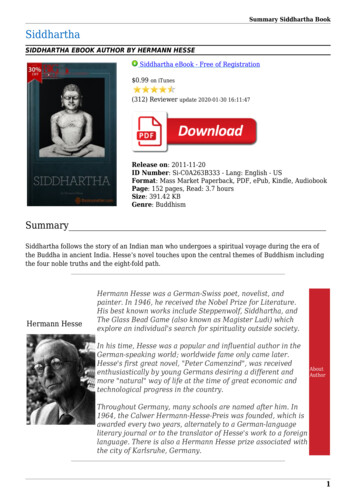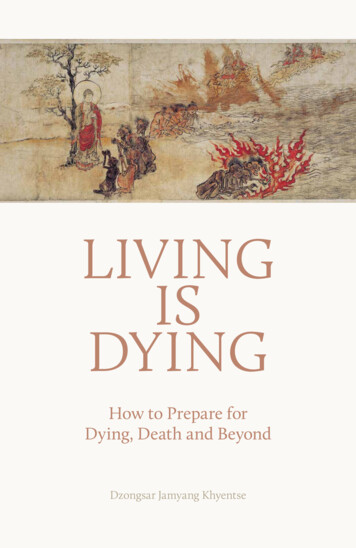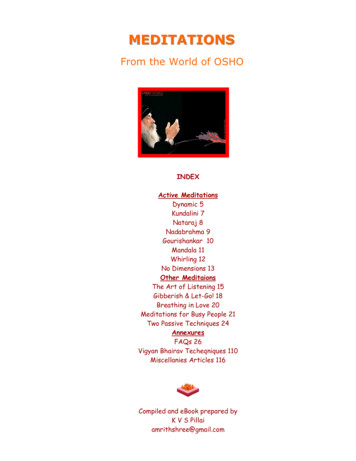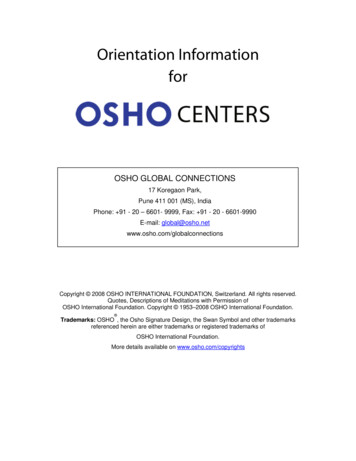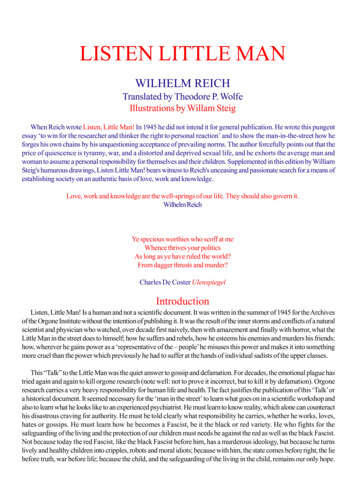
Transcription
Siddhartha1SiddharthaThe Project Gutenberg EBook of Siddhartha, by Herman Hesse Copyright laws are changing all over theworld. Be sure to check the copyright laws for your country before downloading or redistributing this or anyother Project Gutenberg eBook.This header should be the first thing seen when viewing this Project Gutenberg file. Please do not remove it.Do not change or edit the header without written permission.Please read the "legal small print," and other information about the eBook and Project Gutenberg at thebottom of this file. Included is important information about your specific rights and restrictions in how the filemay be used. You can also find out about how to make a donation to Project Gutenberg, and how to getinvolved.**Welcome To The World of Free Plain Vanilla Electronic Texts****eBooks Readable By Both Humans and By Computers, Since 1971*******These eBooks Were Prepared By Thousands of Volunteers!*****Title: SiddharthaAuthor: Herman HesseRelease Date: February, 2001 [EBook #2500] [Most recently updated: October 23, 2002]Edition: 10
Siddhartha2Language: EnglishCharacter set encoding: ASCII*** START OF THE PROJECT GUTENBERG EBOOK, SIDDHARTHA ***This etext was produced by Michael Pullen globaltraveler5565@yahoo.com , with original translationsmade by: Gunther Olesch, Anke Dreher, Amy Coulter, Stefan Langer, Semyon Chaichenets. Proofreadingcorrections were done by Chandra Yenco cyenco@dnet.net.id and Isaac Jones ijones@cis.ohio state.edu .SIDDHARTHAAn Indian Taleby Hermann HesseFIRST PARTTo Romain Rolland, my dear friendTHE SON OF THE BRAHMANIn the shade of the house, in the sunshine of the riverbank near the boats, in the shade of the Sal wood forest,in the shade of the fig tree is where Siddhartha grew up, the handsome son of the Brahman, the young falcon,together with his friend Govinda, son of a Brahman. The sun tanned his light shoulders by the banks of theriver when bathing, performing the sacred ablutions, the sacred offerings. In the mango grove, shade pouredinto his black eyes, when playing as a boy, when his mother sang, when the sacred offerings were made, whenhis father, the scholar, taught him, when the wise men talked. For a long time, Siddhartha had been partakingin the discussions of the wise men, practising debate with Govinda, practising with Govinda the art ofreflection, the service of meditation. He already knew how to speak the Om silently, the word of words, tospeak it silently into himself while inhaling, to speak it silently out of himself while exhaling, with all theconcentration of his soul, the forehead surrounded by the glow of the clear thinking spirit. He already knewto feel Atman in the depths of his being, indestructible, one with the universe.Joy leapt in his father's heart for his son who was quick to learn, thirsty for knowledge; he saw him growingup to become great wise man and priest, a prince among the Brahmans.Bliss leapt in his mother's breast when she saw him, when she saw him walking, when she saw him sit downand get up, Siddhartha, strong, handsome, he who was walking on slender legs, greeting her with perfectrespect.Love touched the hearts of the Brahmans' young daughters when Siddhartha walked through the lanes of thetown with the luminous forehead, with the eye of a king, with his slim hips.But more than all the others he was loved by Govinda, his friend, the son of a Brahman. He loved Siddhartha'seye and sweet voice, he loved his walk and the perfect decency of his movements, he loved everythingSiddhartha did and said and what he loved most was his spirit, his transcendent, fiery thoughts, his ardent will,his high calling. Govinda knew: he would not become a common Brahman, not a lazy official in charge ofofferings; not a greedy merchant with magic spells; not a vain, vacuous speaker; not a mean, deceitful priest;and also not a decent, stupid sheep in the herd of the many. No, and he, Govinda, as well did not want tobecome one of those, not one of those tens of thousands of Brahmans. He wanted to follow Siddhartha, the
Siddhartha3beloved, the splendid. And in days to come, when Siddhartha would become a god, when he would join theglorious, then Govinda wanted to follow him as his friend, his companion, his servant, his spear carrier, hisshadow.Siddhartha was thus loved by everyone. He was a source of joy for everybody, he was a delight for them all.But he, Siddhartha, was not a source of joy for himself, he found no delight in himself. Walking the rosy pathsof the fig tree garden, sitting in the bluish shade of the grove of contemplation, washing his limbs daily in thebath of repentance, sacrificing in the dim shade of the mango forest, his gestures of perfect decency,everyone's love and joy, he still lacked all joy in his heart. Dreams and restless thoughts came into his mind,flowing from the water of the river, sparkling from the stars of the night, melting from the beams of the sun,dreams came to him and a restlessness of the soul, fuming from the sacrifices, breathing forth from the versesof the Rig Veda, being infused into him, drop by drop, from the teachings of the old Brahmans.Siddhartha had started to nurse discontent in himself, he had started to feel that the love of his father and thelove of his mother, and also the love of his friend, Govinda, would not bring him joy for ever and ever, wouldnot nurse him, feed him, satisfy him. He had started to suspect that his venerable father and his other teachers,that the wise Brahmans had already revealed to him the most and best of their wisdom, that they had alreadyfilled his expecting vessel with their richness, and the vessel was not full, the spirit was not content, the soulwas not calm, the heart was not satisfied. The ablutions were good, but they were water, they did not wash offthe sin, they did not heal the spirit's thirst, they did not relieve the fear in his heart. The sacrifices and theinvocation of the gods were excellent but was that all? Did the sacrifices give a happy fortune? And whatabout the gods? Was it really Prajapati who had created the world? Was it not the Atman, He, the only one,the singular one? Were the gods not creations, created like me and you, subject to time, mortal? Was ittherefore good, was it right, was it meaningful and the highest occupation to make offerings to the gods? Forwhom else were offerings to be made, who else was to be worshipped but Him, the only one, the Atman? Andwhere was Atman to be found, where did He reside, where did his eternal heart beat, where else but in one'sown self, in its innermost part, in its indestructible part, which everyone had in himself? But where, wherewas this self, this innermost part, this ultimate part? It was not flesh and bone, it was neither thought norconsciousness, thus the wisest ones taught. So, where, where was it? To reach this place, the self, myself, theAtman, there was another way, which was worthwhile looking for? Alas, and nobody showed this way,nobody knew it, not the father, and not the teachers and wise men, not the holy sacrificial songs! They kneweverything, the Brahmans and their holy books, they knew everything, they had taken care of everything andof more than everything, the creation of the world, the origin of speech, of food, of inhaling, of exhaling, thearrangement of the senses, the acts of the gods, they knew infinitely much but was it valuable to know all ofthis, not knowing that one and only thing, the most important thing, the solely important thing?Surely, many verses of the holy books, particularly in the Upanishades of Samaveda, spoke of this innermostand ultimate thing, wonderful verses. "Your soul is the whole world", was written there, and it was writtenthat man in his sleep, in his deep sleep, would meet with his innermost part and would reside in the Atman.Marvellous wisdom was in these verses, all knowledge of the wisest ones had been collected here in magicwords, pure as honey collected by bees. No, not to be looked down upon was the tremendous amount ofenlightenment which lay here collected and preserved by innumerable generations of wise Brahmans. Butwhere were the Brahmans, where the priests, where the wise men or penitents, who had succeeded in not justknowing this deepest of all knowledge but also to live it? Where was the knowledgeable one who wove hisspell to bring his familiarity with the Atman out of the sleep into the state of being awake, into the life, intoevery step of the way, into word and deed? Siddhartha knew many venerable Brahmans, chiefly his father, thepure one, the scholar, the most venerable one. His father was to be admired, quiet and noble were his manners,pure his life, wise his words, delicate and noble thoughts lived behind its brow but even he, who knew somuch, did he live in blissfulness, did he have peace, was he not also just a searching man, a thirsty man? Didhe not, again and again, have to drink from holy sources, as a thirsty man, from the offerings, from the books,from the disputes of the Brahmans? Why did he, the irreproachable one, have to wash off sins every day,
Siddhartha4strive for a cleansing every day, over and over every day? Was not Atman in him, did not the pristine sourcespring from his heart? It had to be found, the pristine source in one's own self, it had to be possessed!Everything else was searching, was a detour, was getting lost.Thus were Siddhartha's thoughts, this was his thirst, this was his suffering.Often he spoke to himself from a Chandogya Upanishad the words: "Truly, the name of the Brahman issatyam verily, he who knows such a thing, will enter the heavenly world every day." Often, it seemed near,the heavenly world, but never he had reached it completely, never he had quenched the ultimate thirst. Andamong all the wise and wisest men, he knew and whose instructions he had received, among all of them therewas no one, who had reached it completely, the heavenly world, who had quenched it completely, the eternalthirst."Govinda," Siddhartha spoke to his friend, "Govinda, my dear, come with me under the Banyan tree, let'spractise meditation."They went to the Banyan tree, they sat down, Siddhartha right here, Govinda twenty paces away. Whileputting himself down, ready to speak the Om, Siddhartha repeated murmuring the verse:Om is the bow, the arrow is soul, The Brahman is the arrow's target, That one should incessantly hit.After the usual time of the exercise in meditation had passed, Govinda rose. The evening had come, it wastime to perform the evening's ablution. He called Siddhartha's name. Siddhartha did not answer. Siddharthasat there lost in thought, his eyes were rigidly focused towards a very distant target, the tip of his tongue wasprotruding a little between the teeth, he seemed not to breathe. Thus sat he, wrapped up in contemplation,thinking Om, his soul sent after the Brahman as an arrow.Once, Samanas had travelled through Siddhartha's town, ascetics on a pilgrimage, three skinny, withered men,neither old nor young, with dusty and bloody shoulders, almost naked, scorched by the sun, surrounded byloneliness, strangers and enemies to the world, strangers and lank jackals in the realm of humans. Behindthem blew a hot scent of quiet passion, of destructive service, of merciless self denial.In the evening, after the hour of contemplation, Siddhartha spoke to Govinda: "Early tomorrow morning, myfriend, Siddhartha will go to the Samanas. He will become a Samana."Govinda turned pale, when he heard these words and read the decision in the motionless face of his friend,unstoppable like the arrow shot from the bow. Soon and with the first glance, Govinda realized: Now it isbeginning, now Siddhartha is taking his own way, now his fate is beginning to sprout, and with his, my own.And he turned pale like a dry banana skin."O Siddhartha," he exclaimed, "will your father permit you to do that?"Siddhartha looked over as if he was just waking up. Arrow fast he read in Govinda s soul, read the fear, readthe submission."O Govinda," he spoke quietly, "let's not waste words. Tomorrow, at daybreak I will begin the life of theSamanas. Speak no more of it."Siddhartha entered the chamber, where his father was sitting on a mat of bast, and stepped behind his fatherand remained standing there, until his father felt that someone was standing behind him. Quoth the Brahman:"Is that you, Siddhartha? Then say what you came to say."
Siddhartha5Quoth Siddhartha: "With your permission, my father. I came to tell you that it is my longing to leave yourhouse tomorrow and go to the ascetics. My desire is to become a Samana. May my father not oppose this."The Brahman fell silent, and remained silent for so long that the stars in the small window wandered andchanged their relative positions, 'ere the silence was broken. Silent and motionless stood the son with his armsfolded, silent and motionless sat the father on the mat, and the stars traced their paths in the sky. Then spokethe father: "Not proper it is for a Brahman to speak harsh and angry words. But indignation is in my heart. Iwish not to hear this request for a second time from your mouth."Slowly, the Brahman rose; Siddhartha stood silently, his arms folded."What are you waiting for?" asked the father.Quoth Siddhartha: "You know what."Indignant, the father left the chamber; indignant, he went to his bed and lay down.After an hour, since no sleep had come over his eyes, the Brahman stood up, paced to and fro, and left thehouse. Through the small window of the chamber he looked back inside, and there he saw Siddharthastanding, his arms folded, not moving from his spot. Pale shimmered his bright robe. With anxiety in hisheart, the father returned to his bed.After another hour, since no sleep had come over his eyes, the Brahman stood up again, paced to and fro,walked out of the house and saw that the moon had risen. Through the window of the chamber he looked backinside; there stood Siddhartha, not moving from his spot, his arms folded, moonlight reflecting from his bareshins. With worry in his heart, the father went back to bed.And he came back after an hour, he came back after two hours, looked through the small window, sawSiddhartha standing, in the moon light, by the light of the stars, in the darkness. And he came back hour afterhour, silently, he looked into the chamber, saw him standing in the same place, filled his heart with anger,filled his heart with unrest, filled his heart with anguish, filled it with sadness.And in the night's last hour, before the day began, he returned, stepped into the room, saw the young manstanding there, who seemed tall and like a stranger to him."Siddhartha," he spoke, "what are you waiting for?""You know what.""Will you always stand that way and wait, until it'll becomes morning, noon, and evening?""I will stand and wait."You will become tired, Siddhartha.""I will become tired.""You will fall asleep, Siddhartha.""I will not fall asleep.""You will die, Siddhartha."
Siddhartha6"I will die.""And would you rather die, than obey your father?""Siddhartha has always obeyed his father.""So will you abandon your plan?""Siddhartha will do what his father will tell him to do."The first light of day shone into the room. The Brahman saw that Siddhartha was trembling softly in hisknees. In Siddhartha's face he saw no trembling, his eyes were fixed on a distant spot. Then his father realizedthat even now Siddhartha no longer dwelt with him in his home, that he had already left him.The Father touched Siddhartha's shoulder."You will," he spoke, "go into the forest and be a Samana. When you'll have found blissfulness in the forest,then come back and teach me to be blissful. If you'll find disappointment, then return and let us once againmake offerings to the gods together. Go now and kiss your mother, tell her where you are going to. But for meit is time to go to the river and to perform the first ablution."He took his hand from the shoulder of his son and went outside. Siddhartha wavered to the side, as he tried towalk. He put his limbs back under control, bowed to his father, and went to his mother to do as his father hadsaid.As he slowly left on stiff legs in the first light of day the still quiet town, a shadow rose near the last hut, whohad crouched there, and joined the pilgrim Govinda."You have come," said Siddhartha and smiled."I have come," said Govinda.WITH THE SAMANASIn the evening of this day they caught up with the ascetics, the skinny Samanas, and offered them theircompanionship and obedience. They were accepted.Siddhartha gave his garments to a poor Brahman in the street. He wore nothing more than the loincloth andthe earth coloured, unsown cloak. He ate only once a day, and never something cooked. He fasted for fifteendays. He fasted for twenty eight days. The flesh waned from his thighs and cheeks. Feverish dreams flickeredfrom his enlarged eyes, long nails grew slowly on his parched fingers and a dry, shaggy beard grew on hischin. His glance turned to icy when he encountered women; his mouth twitched with contempt, when hewalked through a city of nicely dressed people. He saw merchants trading, princes hunting, mourners wailingfor their dead, whores offering themselves, physicians trying to help the sick, priests determining the mostsuitable day for seeding, lovers loving, mothers nursing their children and all of this was not worthy of onelook from his eye, it all lied, it all stank, it all stank of lies, it all pretended to be meaningful and joyful andbeautiful, and it all was just concealed putrefaction. The world tasted bitter. Life was torture.A goal stood before Siddhartha, a single goal: to become empty, empty of thirst, empty of wishing, empty ofdreams, empty of joy and sorrow. Dead to himself, not to be a self any more, to find tranquility with anemptied heard, to be open to miracles in unselfish thoughts, that was his goal. Once all of my self wasovercome and had died, once every desire and every urge was silent in the heart, then the ultimate part of me
Siddhartha7had to awake, the innermost of my being, which is no longer my self, the great secret.Silently, Siddhartha exposed himself to burning rays of the sun directly above, glowing with pain, glowingwith thirst, and stood there, until he neither felt any pain nor thirst any more. Silently, he stood there in therainy season, from his hair the water was dripping over freezing shoulders, over freezing hips and legs, andthe penitent stood there, until he could not feel the cold in his shoulders and legs any more, until they weresilent, until they were quiet. Silently, he cowered in the thorny bushes, blood dripped from the burning skin,from festering wounds dripped pus, and Siddhartha stayed rigidly, stayed motionless, until no blood flowedany more, until nothing stung any more, until nothing burned any more.Siddhartha sat upright and learned to breathe sparingly, learned to get along with only few breathes, learned tostop breathing. He learned, beginning with the breath, to calm the beat of his heart, leaned to reduce the beatsof his heart, until they were only a few and almost none.Instructed by the oldest if the Samanas, Siddhartha practised self denial, practised meditation, according to anew Samana rules. A heron flew over the bamboo forest and Siddhartha accepted the heron into his soul,flew over forest and mountains, was a heron, ate fish, felt the pangs of a heron's hunger, spoke the heron'scroak, died a heron's death. A dead jackal was lying on the sandy bank, and Siddhartha's soul slipped insidethe body, was the dead jackal, lay on the banks, got bloated, stank, decayed, was dismembered by hyaenas,was skinned by vultures, turned into a skeleton, turned to dust, was blown across the fields. And Siddhartha'ssoul returned, had died, had decayed, was scattered as dust, had tasted the gloomy intoxication of the cycle,awaited in new thirst like a hunter in the gap, where he could escape from the cycle, where the end of thecauses, where an eternity without suffering began. He killed his senses, he killed his memory, he slipped outof his self into thousands of other forms, was an animal, was carrion, was stone, was wood, was water, andawoke every time to find his old self again, sun shone or moon, was his self again, turned round in the cycle,felt thirst, overcame the thirst, felt new thirst.Siddhartha learned a lot when he was with the Samanas, many ways leading away from the self he learned togo. He went the way of self denial by means of pain, through voluntarily suffering and overcoming pain,hunger, thirst, tiredness. He went the way of self denial by means of meditation, through imagining the mindto be void of all conceptions. These and other ways he learned to go, a thousand times he left his self, forhours and days he remained in the non self. But though the ways led away from the self, their endnevertheless always led back to the self. Though Siddhartha fled from the self a thousand times, stayed innothingness, stayed in the animal, in the stone, the return was inevitable, inescapable was the hour, when hefound himself back in the sunshine or in the moonlight, in the shade or in the rain, and was once again his selfand Siddhartha, and again felt the agony of the cycle which had been forced upon him.By his side lived Govinda, his shadow, walked the same paths, undertook the same efforts. They rarely spoketo one another, than the service and the exercises required. Occasionally the two of them went through thevillages, to beg for food for themselves and their teachers."How do you think, Govinda," Siddhartha spoke one day while begging this way, "how do you think did weprogress? Did we reach any goals?"Govinda answered: "We have learned, and we'll continue learning. You'll be a great Samana, Siddhartha.Quickly, you've learned every exercise, often the old Samanas have admired you. One day, you'll be a holyman, oh Siddhartha."Quoth Siddhartha: "I can't help but feel that it is not like this, my friend. What I've learned, being among theSamanas, up to this day, this, oh Govinda, I could have learned more quickly and by simpler means. In everytavern of that part of a town where the whorehouses are, my friend, among carters and gamblers I could havelearned it."
Siddhartha8Quoth Govinda: "Siddhartha is putting me on. How could you have learned meditation, holding your breath,insensitivity against hunger and pain there among these wretched people?"And Siddhartha said quietly, as if he was talking to himself: "What is meditation? What is leaving one's body?What is fasting? What is holding one's breath? It is fleeing from the self, it is a short escape of the agony ofbeing a self, it is a short numbing of the senses against the pain and the pointlessness of life. The same escape,the same short numbing is what the driver of an ox cart finds in the inn, drinking a few bowls of rice wine orfermented coconut milk. Then he won't feel his self any more, then he won't feel the pains of life any more,then he finds a short numbing of the senses. When he falls asleep over his bowl of rice wine, he'll find thesame what Siddhartha and Govinda find when they escape their bodies through long exercises, staying in thenon self. This is how it is, oh Govinda."Quoth Govinda: "You say so, oh friend, and yet you know that Siddhartha is no driver of an ox cart and aSamana is no drunkard. It's true that a drinker numbs his senses, it's true that he briefly escapes and rests, buthe'll return from the delusion, finds everything to be unchanged, has not become wiser, has gathered noenlightenment, has not risen several steps."And Siddhartha spoke with a smile: "I do not know, I've never been a drunkard. But that I, Siddhartha, findonly a short numbing of the senses in my exercises and meditations and that I am just as far removed fromwisdom, from salvation, as a child in the mother's womb, this I know, oh Govinda, this I know."And once again, another time, when Siddhartha left the forest together with Govinda, to beg for some food inthe village for their brothers and teachers, Siddhartha began to speak and said: "What now, oh Govinda, mightwe be on the right path? Might we get closer to enlightenment? Might we get closer to salvation? Or do weperhaps live in a circle we, who have thought we were escaping the cycle?"Quoth Govinda: "We have learned a lot, Siddhartha, there is still much to learn. We are not going around incircles, we are moving up, the circle is a spiral, we have already ascended many a level."Siddhartha answered: "How old, would you think, is our oldest Samana, our venerable teacher?"Quoth Govinda: "Our oldest one might be about sixty years of age."And Siddhartha: "He has lived for sixty years and has not reached the nirvana. He'll turn seventy and eighty,and you and me, we will grow just as old and will do our exercises, and will fast, and will meditate. But wewill not reach the nirvana, he won't and we won't. Oh Govinda, I believe out of all the Samanas out there,perhaps not a single one, not a single one, will reach the nirvana. We find comfort, we find numbness, welearn feats, to deceive others. But the most important thing, the path of paths, we will not find.""If you only," spoke Govinda, "wouldn't speak such terrible words, Siddhartha! How could it be that amongso many learned men, among so many Brahmans, among so many austere and venerable Samanas, among somany who are searching, so many who are eagerly trying, so many holy men, no one will find the path ofpaths?"But Siddhartha said in a voice which contained just as much sadness as mockery, with a quiet, a slightly sad, aslightly mocking voice: "Soon, Govinda, your friend will leave the path of the Samanas, he has walked alongyour side for so long. I'm suffering of thirst, oh Govinda, and on this long path of a Samana, my thirst hasremained as strong as ever. I always thirsted for knowledge, I have always been full of questions. I have askedthe Brahmans, year after year, and I have asked the holy Vedas, year after year, and I have asked the devoteSamanas, year after year. Perhaps, oh Govinda, it had been just as well, had been just as smart and just asprofitable, if I had asked the hornbill bird or the chimpanzee. It took me a long time and am not finishedlearning this yet, oh Govinda: that there is nothing to be learned! There is indeed no such thing, so I believe,
Siddhartha9as what we refer to as learning'. There is, oh my friend, just one knowledge, this is everywhere, this isAtman, this is within me and within you and within every creature. And so I'm starting to believe that thisknowledge has no worser enemy than the desire to know it, than learning."At this, Govinda stopped on the path, rose his hands, and spoke: "If you, Siddhartha, only would not botheryour friend with this kind of talk! Truly, you words stir up fear in my heart. And just consider: what wouldbecome of the sanctity of prayer, what of the venerability of the Brahmans' caste, what of the holiness of theSamanas, if it was as you say, if there was no learning?! What, oh Siddhartha, what would then become of allof this what is holy, what is precious, what is venerable on earth?!"And Govinda mumbled a verse to himself, a verse from an Upanishad:He who ponderingly, of a purified spirit, loses himself in the meditation of Atman, unexpressable by words ishis blissfulness of his heart.But Siddhartha remained silent. He thought about the words which Govinda had said to him and thought thewords through to their end.Yes, he thought, standing there with his head low, what would remain of all that which seemed to us to beholy? What remains? What can stand the test? And he shook his head.At one time, when the two young men had lived among the Samanas for about three years and had sharedtheir exercises, some news, a rumour, a myth reached them after being retold many times: A man hadappeared, Gotama by name, the exalted one, the Buddha, he had overcome the suffering of the world inhimself and had halted the cycle of rebirths. He was said to wander through the land, teaching, surrounded bydisciples, without possession, without home, without a wife, in the yellow cloak of an ascetic, but with acheerful brow, a man of bliss, and Brahmans and princes would bow down before him and would become hisstudents.This myth, this rumour, this legend resounded, its fragrants rose up, here and there; in the towns, theBrahmans spoke of it and in the forest, the Samanas; again and again, the name of Gotama, the Buddhareached the ears of the young men, with good and with bad talk, with praise and with defamation.It was as if the plague had broken out in a country and news had been spreading around that in one or anotherplace there was a man, a wise man, a knowledgeable one, whose word and breath was enough to healeveryone who had been infected with the pestilence, and as such news would go through the land andeveryone would talk about it, many would believe, many would doubt, but many would get on their way assoon as possible, to seek the wise man, the helper, just like this this myth ran through the land, that fragrantmyth of Gotama, the Buddha, the wise man of the family of Sakya. He possessed, so the believers said, thehighest enlightenment, he remembered his previous lives, he had reached the nirvana and never returned intothe cycle, was never again submerged in the murky river of physical forms. Many wonderful and unbelievablethings were reported of him, he had performed miracles, had overcome the devil, had spoken to the gods. Buthis enemies and disbelievers said, this Gotama was a vain seducer, he would spent his days in luxury, scornedthe offerings, was without learning, and knew neither exercises nor self castigation.The myth of Buddha sounded sweet. The scent of magic flowed from these reports. After all, the world wassick, life was hard to be
Siddhartha did and said and what he loved most was his spirit, his transcendent, fiery thoughts, his ardent will, his high calling. Govinda knew: he would not become a common Brahman, not a lazy official in charge of offerings; not a greedy merchant with magic spells; not a vain, vacuous speaker; not a mean, deceitful priest;
